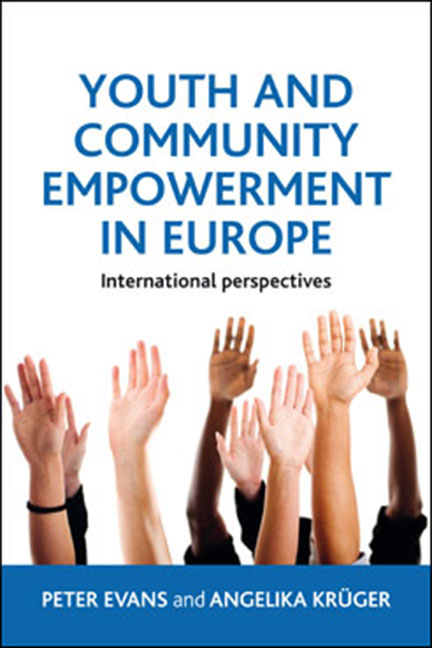Book contents
- Frontmatter
- Dedication
- Contents
- List of figures and tables
- List of abbreviations
- Acknowledgements
- Preface
- Background to the Youth Empowerment Partnership Programme
- one Introduction: the theoretical context of the YEPP approach
- two YEPP I: implementation
- three YEPP I: key changes in YEPP Local Programme Sites
- four YEPP I: meeting the goals
- five YEPP II: learning from YEPP I
- six YEPP II: portraits and overall programme outcomes
- seven YEPP I and II: conclusions and policy implications
- Epilogue: The future of YEPP
- References
- Index
Background to the Youth Empowerment Partnership Programme
Published online by Cambridge University Press: 07 September 2022
- Frontmatter
- Dedication
- Contents
- List of figures and tables
- List of abbreviations
- Acknowledgements
- Preface
- Background to the Youth Empowerment Partnership Programme
- one Introduction: the theoretical context of the YEPP approach
- two YEPP I: implementation
- three YEPP I: key changes in YEPP Local Programme Sites
- four YEPP I: meeting the goals
- five YEPP II: learning from YEPP I
- six YEPP II: portraits and overall programme outcomes
- seven YEPP I and II: conclusions and policy implications
- Epilogue: The future of YEPP
- References
- Index
Summary
This book provides an up-to-date account of the first decade of the Youth Empowerment Partnership Programme (YEPP) (2001–11). In 2012 YEPP entered a new era, and although ‘YEPP’, as an approach and methodology, continues to be implemented in YEPP Local Sites, the organisational structure and governance at an international level have taken a different form from the first decade. As a result, the authors prefer to use the past tense in this section when referring to YEPP I and YEPP II.
YEPP was supported by a consortium of European and American foundations and aims to improve the quality of life of young people living in disadvantaged communities through their empowerment and active participation in their local communities and societies at large. YEPP originated within the Youth and Education Interest Group of the European Foundation Centre (EFC) in 1998 following a commissioned review of Foundations’ ‘Youth funding and policies’ in Europe and the US by Krüger and Picht (1999). The Network of European Foundations for Innovative Cooperation (NEF) provided the legal framework for the programme. The European Foundation Centre (EFC) in which YEPP ‘was born’ has remained as a supportive partner for making contacts with foundations and international organisations.
YEPP was overseen by a Steering Committee whose principal members were representatives of the contributing Foundations, the International Academy for Innovative Pedagogy, Psychology and Economics (INAgGmbH) of the Free University of Berlin and NEF. Permanent observers were the EFC and, from 2002 to 2008, the representative from the Centre for Educational Research and Innovation of the Organisation for Economic Cooperation and Development (OECD/CERI).
As of 2011, the partner foundations of YEPP and members of the Steering Committee were: Barrow Cadbury Trust, Charles Stewart Mott Foundation (Vice Chair), Compagnia di San Paolo (Chair), Evens Foundation, Foundation Bernheim and the Irish Youth Foundation.
Since the beginning of 2012, three of the former partner foundations are providing start-up funding for the new era of YEPP: Barrow Cadbury Trust, Charles Stewart Mott Foundation, and Compagnia di San Paolo.
- Type
- Chapter
- Information
- Youth and Community Empowerment in EuropeInternational Perspectives, pp. xix - xxviPublisher: Bristol University PressPrint publication year: 2012



